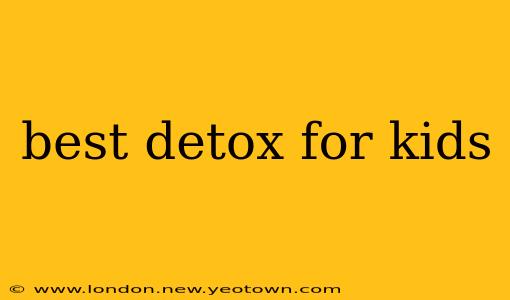Let's be honest, the phrase "detox for kids" conjures up images of restrictive diets and expensive, questionable products. But the truth is far simpler and more wholesome. There's no magic juice or cleanse that will suddenly purify a child's body. Instead, focusing on healthy habits is the ultimate "detox" – a gentle, effective way to support their well-being. Think of it as a nourishing reset rather than a drastic cleanse.
This isn't about eliminating things; it's about adding good things. It's about building a foundation for a lifetime of health. This approach focuses on supporting the body's natural ability to eliminate toxins through healthy eating, hydration, and physical activity. Let's dive in and explore what truly constitutes a healthy approach to supporting children's well-being.
What Does a "Detox" for Kids Really Mean?
Before we get into specifics, it's important to understand what a "kid-friendly detox" truly entails. It's not about restrictive diets, fad cleanses, or expensive supplements. These methods can be harmful and even dangerous for growing children. A healthy approach focuses on:
- Optimal Nutrition: Providing a balanced diet rich in fruits, vegetables, whole grains, and lean proteins.
- Hydration: Ensuring adequate water intake throughout the day.
- Physical Activity: Encouraging regular exercise and playtime.
- Adequate Sleep: Prioritizing sufficient sleep for age-appropriate rest and recovery.
- Minimizing Toxin Exposure: Reducing exposure to environmental toxins and processed foods whenever possible.
What are the best foods for a kid's healthy diet?
This isn't about eliminating entire food groups, but rather focusing on nutrient-dense options. Think vibrant colours!
- Fruits and Vegetables: Aim for a rainbow of colors – red peppers, blueberries, broccoli, spinach – packed with vitamins, minerals, and antioxidants. Involve your kids in preparing these foods; they're much more likely to eat something they helped make.
- Whole Grains: Opt for whole-wheat bread, brown rice, and quinoa instead of refined grains. These provide more fiber, which is crucial for digestion.
- Lean Proteins: Chicken, fish, beans, and lentils provide essential amino acids for growth and development.
- Healthy Fats: Avocado, nuts, and seeds offer essential fatty acids that support brain function and overall health. Limit processed fats and sugary snacks.
How much water should my child drink?
Water is essential for all bodily functions. The amount your child needs depends on their age, activity level, and climate. However, encouraging regular water intake throughout the day is key. Offer water frequently, and make it appealing by adding slices of fruit or cucumber. Avoid sugary drinks, as they can dehydrate rather than hydrate.
How much sleep do kids need?
Sleep is crucial for growth, development, and overall well-being. Ensure your child is getting enough sleep for their age group. A consistent bedtime routine can significantly help improve sleep quality.
How can I minimize my child's exposure to toxins?
While complete avoidance is impossible, you can take steps to reduce your child's exposure to harmful substances:
- Choose natural cleaning products: Opt for eco-friendly cleaning products to minimize exposure to harsh chemicals.
- Limit processed foods: Processed foods often contain artificial ingredients, preservatives, and excessive sugar, which are not beneficial for health.
- Ensure good ventilation: Proper ventilation in your home helps reduce the buildup of indoor pollutants.
My child is constipated. Is this a sign of needing a detox?
Constipation is a common issue in children and is often related to diet and hydration. Before considering anything drastic, focus on increasing fiber intake (fruits, vegetables, whole grains), ensuring adequate water intake, and encouraging regular physical activity. If constipation persists, consult a pediatrician.
Are there any supplements I should give my child for a detox?
Avoid giving your child any supplements marketed as "detox" products. These are often unnecessary and may even be harmful. A balanced diet and healthy lifestyle are the best ways to support your child's well-being. If you have concerns about nutritional deficiencies, consult a pediatrician or registered dietitian.
In conclusion, the "best detox" for kids isn't a quick fix; it's a long-term commitment to healthy habits. By focusing on nutrition, hydration, activity, and sleep, you're empowering your child with the tools they need to thrive. Remember, a healthy lifestyle is the most effective and safest way to support your child's well-being. Consult with your pediatrician or a registered dietitian for personalized guidance.

